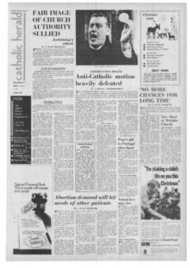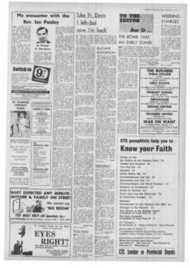Page 14, 1st December 1967
Page 14

Report an error
Noticed an error on this page?If you've noticed an error in this article please click here to report it.
Tags
Share
Related articles
A Convent Schoolgirl’s Tale
David Frost Survives Toughest Test Yet
People And Places
People And Places
Kerry Dancing With Delight
LUNCH WITH DAVID FROST
.:161■1 Edited by Kerry Stephenson wasn t anything as grand as a breakfast with David Frost. There were no M.P.s, no George Browns, no starlets and the only other journalist • present whom I recognised was James Cameron, the telly reporter, who goes on those bombing raids in Hanoi.
It was, in fact, a lunch with David Frost last Sunday at the Charing Cross Hotel, London. There was the usual aperitif and then the gathering of about 30 of us sat down to a main course which is rarely, if ever, seen in Britain.
It comprised an unappetising bowl of porridge, made from powdered milk and rough grain, followed by fish-protein biscuits. When the meal was over there were very few among us who had had the courage or tenacity to finish our lunch.
The meal we ate is the staple diet of millions of people in India. It was given to us to mark the opening of Oxfam's Christmas Appeal, which this year is being led by David Frost.
He went to India in the autumn prepared to find misery and death, he said, but what he found exceeded his imagination.
He returned to Britain convinced that Oxfam was spending "every penny as wisely as possible.
Contributions to Oxfam kept alive half a million in the Bihar last year, and this year they could keep another million alive.
The short talk Mr. Frost gave us we've all heard before. But still we listened as the chilly statistics came spilling out. A million new mouths to feed every month. Stunted bodies and stunted brains from malnutrition. World famine in 20 years if we don't teach countries like India to feed themselves.
In some of the developing countries fifty per cent of the children die before school age. In some parts of India up to 80 per cent of the children suffer from dwarfism, the byproduct of malnutrition.
The words were eloquent and sad. This was not the thrusting Frost of the telly. This was the shaken Frost whose compassion was real and moving.
The occasion was made even more sad by the fact that only a few hours before David's father, the Rev. Wilfred Frost, a retired Methodist minister, died in the Suffolk market town of Beccles. He was 67 and had been ill recently.
Laity group's newmembers
THE future work of the
Laity Commission and the manner in which it can further lay participation in the Church's apostolic mission was discussed at a meeting on the Commission in London last month.
Members of the Commission have elected two further members — Mr. Dan McGarveY, president of the Amalgamated Society of Boilermakers, and Sister Philomena, a Little Sister of the Assumption, who is a family welfare worker at the Bronte Youth and Community Centre in Liverpool.
"So this is where it all is," murmurs Mr. William Mitchell, on Sunday evening as he examines the film strip of his son's ordination after a special screening at Greyfriars Hall, Bristol.
With his wife, Catherine, Mr. Mitchell is inspecting the film strip which is to be shown throughout the country in a bid to increase priestly vocations.
The 20-minute strip was produced by Fr. Robert Bulbeck, S.J., as a sort of "up front" look at an ordination.
In an interesting commentary Fr. Bulbeck takes the audience into the sanctuary and explains the ceremony which makes Michael Mitchell Fr. Raymund Mitchell, 0.F.M. (Order of Friars Minor).
It's not Fr. Bulbeck's first excursion into the film-makers' world. His "Life of Christ" visual aids for primary school children are well known.
Early in 1968 he hopes to produce a film-talk on a "sick call." In the early centuries the "anointing of the sick" was not connected with death. "Now Vatican II has restored the sacrament to its early use of being a remedy for soul and body," he says.
blog comments powered by Disqus















